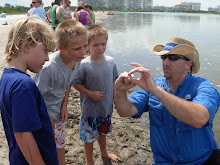The Florida Fish and Wildlife Conservation Commission’s Fish and Wildlife Research Institute (FWRI) Tarpon Genetic Recapture Study encourage anglers throughout the state to genetically sample their tarpon prior to release for identification purposes. A small sample of skin cells collected from the outer jaw of a captured tarpon provides enough DNA to determine whether the fish was previously caught. Since 2005, the study has identified 37 recaptured tarpon from DNA samples submitted by Florida anglers, which roughly equates to 1 out of every 100 genetically tagged tarpon sampled.
The recapture study’s motto is
“Any Tarpon, Anywhere, Any Size.” For example, small tarpon can be caught year-round in Florida. Information on recaptures of these small, immature fish can provide researchers with information on habitat preferences, residency, and site fidelity (being caught in the same area year after year). It is important that the young fish survive to become mature adults and learning about them and their habitats is critical for their conservation. Recapture information from older and larger fish can provide researchers some insight on the connectivity of the coastal and inshore waterways for tarpon movements, site fidelity and evidence of long-term survival of sexually mature tarpon.
Unlike conventional tagging methods, DNA will not break and does not rely on technology to work. It will not fall out or rub off the fish, and can't get covered in algae making it hard to see. All of the lab work is done in house at the FWC-FWRI lab in St. Petersburg so there is no extra expense to ship samples elsewhere for processing, making it a very cost effective program.
 |
| Image credit: FWC-FWRI |
Scrape the boney upper jaw with the provided sponge to remove some skin cells. Be sure the sponge has silver tissue on it. You may need to scrape hard to ensure skin cells come off the fish. Researchers want the silvery cells, not slime. As long as you do not remove the fish from the water, you do not need the $50 tarpon tag while sampling.
Place the used sponge into a labeled vial, and fill out the data sheet provided in the kit. The kits do not need to be refrigerated, they don't expire, and the liquid is not hazardous to touch or mail. Anglers who return samples (with completed information) get their names entered in an annual prize drawing.
Anglers are asked to make it a habit and carry a DNA sampling kit with them. Each kit is in a small zip lock bag and has enough material to sample three tarpon. Anglers can call toll free 1-800-367-4461, email TarponGenetics@MyFWC, or contact me at (239) 417-6310 x204 to obtain a free kit. There are more than 165 statewide collection centers that can be visited to obtain a DNA sampling kit. These local businesses also serve as places where people can drop off their tarpon samples at no cost to the angler. Tarpon team members contact the shops monthly to pick up samples and resupply the DNA sampling kits. Some of the local collection sites in Collier County include Caxambas Pass Ship Store, Port of the Islands Marina, Goodland Boat Ramp Ship Store, Captain Bill's Bait & Tackle, Captain Pete’s Bait & Tackle, and Mangrove Outfitters.
To learn more about the Tarpon Genetic Recapture Study visit:
http://myfwc.com/research/saltwater/tarpon/genetics/recapture-study/.
Happy tarpon fishing!!!!
 |
| Image Credit: Dr. Kathy Guindon, FWC-FWRI |





No comments:
Post a Comment